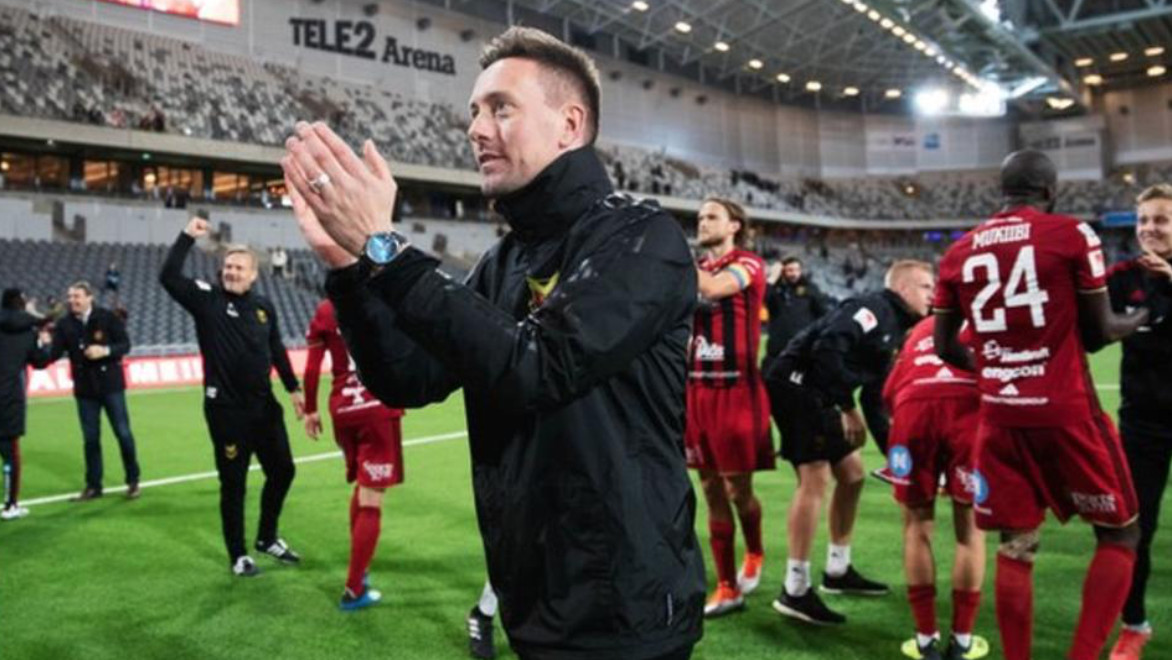/cdn.vox-cdn.com/uploads/chorus_image/image/65538855/Screen_Shot_2019_10_23_at_10.20.07.0.png)
It’s February 2018 and Ostersunds FK are 2-0 up after 23 mins at Arsenal in the Europa League, where they are trying to overturn a 0-3 first-leg deficit.
Unsurprisingly they ultimately fail. Saed Kolasinac calms Arsenal nerves with a goal in the second-half. Ostersunds hold on to win the meeting, 2-1.
It was a fitting end to a 14-game Euro-Odyssey during which the small northern Swedish club became the first from its country to advance beyond the Europa League group stages.
Only eight years previously Ostersunds, created through an amalgam of local clubs in 1996, found themselves for the first time in the fourth tier of Swedish football. Normally they held their own, a level above.
It was a remarkable rise, but now 20 months on from that memorable night in London the club faces a fight for its very existence.
A statement on their official website a few weeks ago read: “For us football lovers there is no alternative. Ostersund without an elite football team is unthinkable.”
But the club’s financial figures are stark.
They need to raise 15m Swedish krona (kr) - about $1.55m - by the end of the year to keep the club running, with 10m kr of that sum to be paid by the end of October. Somewhere in the region of 7m kr has been raised.
A 1.4m kr tax bill needs to be paid by 2 November.
The club is pulling on fans a local business for support.
”We ask you to think back on all the wonderful memories and what joy and pride we experienced together with OFK. If we are to experience it again, we must together help to get out of this crisis,” continued the club statement.
Former manager Englishman Graham Potter, now boss at Brighton & Hove Albion in England’s Premier League, has donated, as has his former coaching staff and some players.
Potter brought OFK to the Allsvenskan (Sweden’s top tier) for the first time in 2015. The run of glory continued when they won the Svenska Cupen in 2017, defeating IFK Norrkoping 4-1 in the final, a result that secured Europa League soccer.
-no_upscale()/cdn.vox-cdn.com/uploads/chorus_asset/file/19312545/923551518.jpg.jpg)
Former chairman Daniel Kindberg was the man who hired Potter and oversaw the club’s meteoric rise. Kindberg has been on trial in Sweden accused of serious financial crimes - accusations he denies. The judge’s verdict is expected on 5 November.
The club say they have lost 7m krona in sponsorship revenue and failed to bring in 20m kr in player sales and 5m kr in matchday revenue that they had budgeted for.
”It is a critical situation,” manager Ian Burchnall told BBC Sport. “This has come quickly and out of nowhere considering where the club was a short period of time ago.
”The club had an unbelievable journey, but a lot of things behind the scenes have happened since then.”
While things looked more bleak a few weeks ago at the end of a 7-game losing streak, four points in their last 2 games have given OFK greater optimism for survival in the Swedish top flight at least for another season. They sit in 11th place, five points clear of Sundsvall in the promotion/relegation play-off spot, with only two games remaining.
Burchnall (36), another English manager followed the departed Potter. Former Manchester United youth and West Ham player Ravel Morrison spent five months at OFK before leaving for Sheffield United in July.
”This year the club had its best ever start in the Swedish league, but since the summer it has been very difficult with what is happening off the pitch.
”We have probably been in the news this year more than any other team in Sweden for many different reasons, but mostly for the off-field problems, the ongoing court case, the economic problems and the FIFA transfer embargo [installed after the transfer of Saman Ghoddos to French club Amiens].
”It is a really young squad. At one point we fielded the youngest team in the Swedish League for 20 years. Of course it [the financial situation] affects them - either consciously or subconsciously.”
Burchnall said the loss of the club, which has average attendances of 4,800, would be “huge”.
”Over the years Graham and his team and I have sustained top-flight football in the north of Sweden, where they had not had it for years,” he said. “To have a team up here competing is a massive thing. The fans here are unbelievable. They almost relentlessly support no matter what the situation. It is testament to them and a lot of people have come forward to try raise funds quickly.”
Club administrators are adamant that, “We will fix this.”

Burchnall says, ”We have to look forward. I am planning for the next game, but when we discuss the squad and players, we talk as if we have a long-term view on it.”
Ostersunds’ has been a remarkable story so far, with Potter initially building a squad comprising low-cost acquisitions, including two who arrived from English non-league football in Jamie Hopcutt (Tadcaster Albion) and Curtis Edwards, who each featured against Arsenal.
The two goal-scorers from that evening have moved on. Hosam Aiesh joined IFK Goteborg earlier this year and Ken Sema, now on-loan at Serie A’s Udinese, joined Watford in 2018.
Much now depends on supporters digging deep and an effective rallying of the area’s business community if the club is to repeat its European heroics which saw Turkish giants Galatasaray and Hertha Berlin of the Bundesliga eclipsed by the Swedish minnows.
One careful step at a time though. Right now all those involved with Ostersunds FK will settle for survival, and cross fingers a place in next season’s Allsvenskan can be secured.
